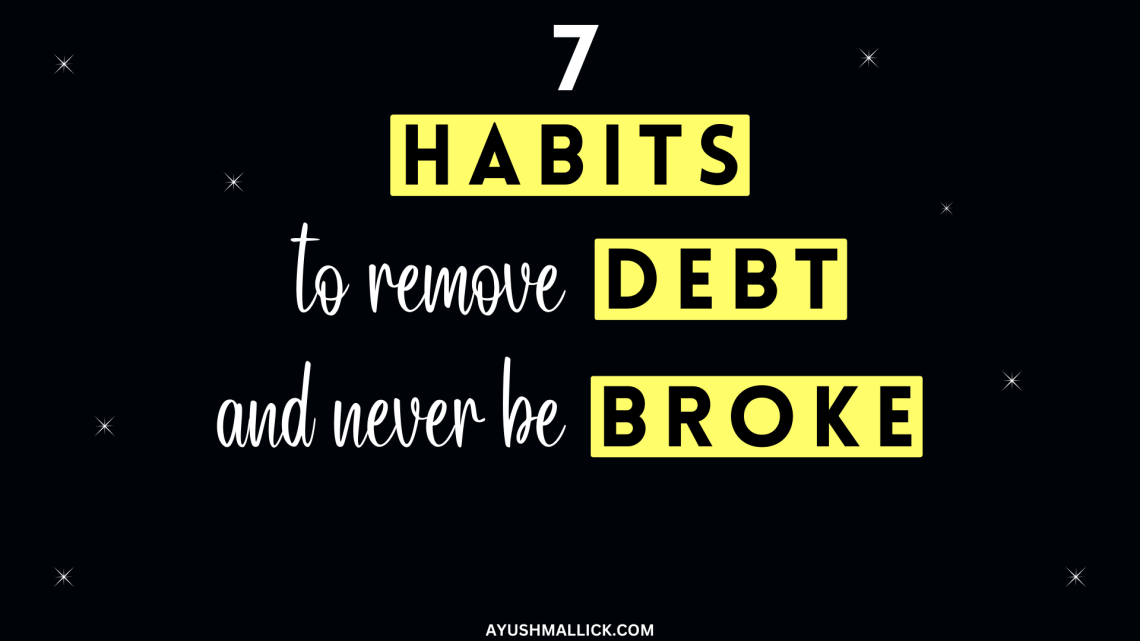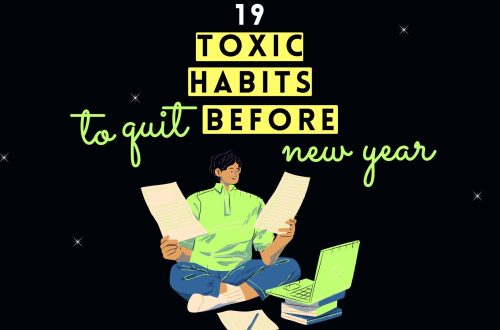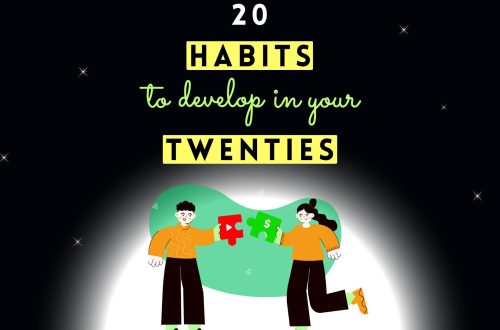
11 Habits To Follow To Come Out Of Debt & Never Be Broke Again
What’s worse than being broke? It’s the combination of the two. While being broke is painful, debt upscales the pain into suffering. It’s seems like a never-ending abys of hell. How the hell can you come of this situation? How can you come out of debt & never be broke again? For that you’ll have to follow certain habits:
Hence, in this post, I’ll list down the 11 habits to come out of debt and never be broke. I’m pretty sure that if you follow any one habit among the 11, your life will improve. You’ll eventually grow financially and never be broke again.
Habit 1: Budgeting
Budgeting is one of the most important factor to follow for healthy finance. But why is budgeting so necessary? It’s because the amount of money you make might not be equal to how much you spend or want to spend.
Budgeting is absolutely necessary if you want to maintain a balance between spending and saving. Unfortunately, most people start budgeting after they have spent most of their money.
This is how you make a solid budget:
(1) Calculate the total money you make every month.
(2) Calculate how much you usually spend every month. Don’t hide any spending. Keep it real.
(3) It’s good if you’re already in the green. If not, see what are some things you can remove from your monthly spending.
(4) Think about more sources of income
If you follow the 4 steps, you’ll become a budgeting expert within few months. Budgeting is easy. You only have to be a little more conscious with your spending.
Final tip: You can either use an budgeting app on your phone or you can go the old route of pen and paper. My opinion would be that you use a budgeting app.
Habit 2: Intelligent Spending
There’s a close relation between budgeting and intelligent spending. If your budgeting is good, you’ll leave no space for unnecessary spending. Intelligent spending is nothing by only buying something that is necessary.
You resist yourself from buying anything that isn’t of much use. It completely depends on how much value you’re extracting from a product after you’ve bought it.
Compulsive buying is dangerous. It creates an illusion of “want” and convinces you to buy things that have almost no need in your life. How to find such things? If there’s anything that hasn’t moved from its place for months or even years, then the thing has no value.
It’s just sitting at a place and emitting negative energies. Which is bad for your surrounding environment.
Habit 3: Frugal Living
Frugal living is a personal preference. Sometimes, even the superrich decide to lead a frugal life, detached from wealth and luxury. Frugal living is exactly opposite to cluttered living. The beauty is in the simplicity.
But sometimes frugal living becomes a necessity when financial situation is a little fragile. Frugal living is not about deprivation but rather about making intentional choices that align with long-term financial goals and personal values. Living frugally encourages a mindset shift from overconsumption to conscious spending and living.
When you spend frugally, you decide to spend money consciously and in a highly calculated manner. You don’t cut your eating expenses, but you can decide money spending for skincare, or stop your gym membership and practice in your home.
Habit 4: Sell Unused Items
Now that you’re trying to live frugally, what should you do with all the unused items? Should you toss them in the garbage or just let them be in corner where you don’t usually visit?
The best solution would be to sell them. By selling those items you can not only get rid of them but also make some chump change.
Selling unused items is nothing new. Even people who have enough cash decide to sell items that they don’t need just so that they can new ones. The Japanese are experts at this. They have a habit of selling or simply throwing them or donating the things they don’t need.
This helps them live a minimalist life and a life devoid of clutter. It’s called the KonMari method. I’ve embrace the KonMari method in my life and it has literally changed everything about my surroundings.
Habit 5: Investing >> Savings
Money doesn’t grow by saving, it grows by investing. I don’t think I will ever forget this sentence. This single sentence pretty much sums up the difference between people with surging fortunes and people with diminishing fortunes.
If a person doesn’t know how to invest correctly and only depends on saving it, one day inflation will eat up all the money without their knowledge. This is highly common among people who win million-dollar lottery. They are back to square one after few years of euphoria.
Hence, you should focus more on safe investments than just saving your money in a low-interest Fixed Deposit. It doesn’t have to be thousands of Dollars, start with few hundreds. Buy mutual funds every months, and little more when the market is down.
Invest in Gold, stocks, real estate. In the end if you’re left with some more money, you can keep it in your Bank as an emergency fund allocation.
Habit 6: Financial Education
Financial education has become immensely important in this day and age. Money is everything! Hence, the more you learn about finance the better it’s for your future. There are countless books on finance that are really good.
These are some books I have read and would absolutely recommend you:
(1) The Millionaire Fastlane
(2) The Psychology of Money
(3) The Intelligent Investor
(4) Common Stocks and Uncommon Profits
(5) Rich Dad Poor Dad
(6) One Up On Wall Street
(7) The Personal MBA
If you read these 7 books, I’m pretty sure you’ll become better than most people around you. I have read all these 7 books and my favorite one is The Psychology of Money. Start with The Psychology of Money if you don’t want to be get overwhelmed by too much technical details about business and investing.
Habit 7: Diversify Income
Peter Lynch, the author of “One Up On Wall Street“ has beautifully said: There is a difference between Diversification and Diworsification. Unfortunately, most people end-up choosing the latter.
Diversification is directly proportional to how secure your financial future is. If you’re dependent on only one source of income it’s time to wake up fast. No matter how successful you present business or job is, in these times of financial imbalance it might vanish the other day.
That’s where diversification comes in as a lifesaver. Let’s say you love your daily job, but nobody knows what you boss is thinking. He/She might not be impressed, for whatever reasons it might be. And suddenly, one day your boss calls you in their room and fires you “gracefully.” What are you going to do now? Who’s going to pay the bills the next month?
You’re already waking the path of Investing a part of your income, now it’s time you focus on diversifying you income stream. You can resort to freelancing, complete side gigs, become a smalltime affiliate marketer, whatever suits you the best.
But, diversify your income as fast as you can.
Habit 8: Avoid Credit Card Overuse
There’s nothing more insidious in the financial world than a credit card. It’s worse than the jetlag you feel after travelling between two time zones. But why is credit card so critical and hard to manage?
Because most people don’t think about the future. They unconsciously, and sometimes conscious, indulge in overspending. This short-lasting happiness becomes a headache after the credit card bill hits their beautiful faces.
So, does that mean using credit card bad? No! In fact, if you have a proper budget, then credit card can be really helpful. The facilities you get is better than a debit card.
Hence, avoid overusing your credit card. Only do it when you’re absolutely sure that you can pay the upcoming bill on time.
Habit 9: Know World Events
Jess Bezos, the founder of Amazon follows a simple morning routine. Warren Buffet, the sweet Billionaire grandpa follows a simple morning routine. Do you know what is common among these two Billionaires from two era? They know what’s going on in the world.
They are voracious readers. Heck, grandpa Warren reads a staggering 6 newspapers a day just to know what the heck is going all over the world. But why? Why are they so eager to know what’s going all over the world?
To find opportunities. Period. Now, you may not be a billionaire, but knowing about the world events will help you take good investment decisions. I hope you’re getting the overall idea.
Habit 10: Avoid Debt
If there’s one thing more complex to handle than a credit card, it’s debt. No, I won’t say that debt is bad, because the purpose of a debt is to help a person or a business take expand.
The problem arises when debt is not managed properly. Debt is one of the major factors responsible for a business’ failure. So it is for an individual person. When a person fails to manage debt consciously, they have no option but to give away their life savings to be debt-free.
Nothing is more painful than that. Hence, when times are hard, avoid debt at all costs. If you have hard time believing me, Warren Buffet and Mark Cuban are the two people you can believe.
Habit 11: Crisis Planning
Life is full of uncertainty. And, finance is even more uncertain. Crisis planning is necessary if you want to maintain a balanced financial life. Questions like: What would happen if sudden the stock market crashes?
Crisis planning is hard, and it needs your constant attention. This is why most people never decide to secure their future from financial crisis. Financial planning includes building an emergency fund to cover essential expenses in times of job loss.
One of the best way to weather financial crisis is by having multiple courses of income, and balance between active and passive income source. Stock dividend is one of the best passive income. The other one is affiliate marketing.






